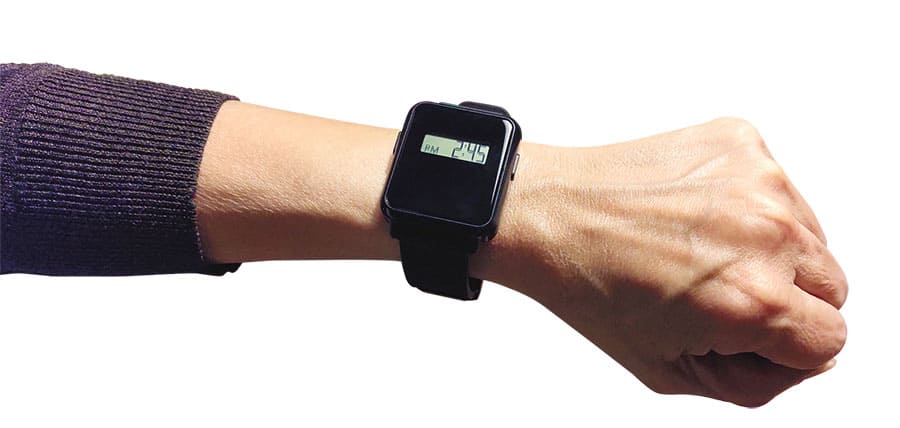Wearable study to explore physical and mental health changes in carers and dementia patients

A six-month research project will explore the mental and physical health changes in 600 carers and dementia patients in their own homes via the Tracmo CareActive Watch.
Tracmo, a location-based & IoT solution provider, is partnering with University of California Berkeley to carry out this research project.
The study will recruit 300 patients and their family carers – 600 participants in total – to examine the correlation between the synchronicity of daily activities between patients and carers, carers’ mental health, and patients’ disease progression.
Over the study period, both the patients and carers will wear the Tracmo CareActive Watch continuously for six months, and carers will be monitored periodically for their mental and physical health changes.
The research project builds on previous studies by Dr. Robert Levenson and Dr. Kuan-Hua Chen at the University of California, Berkeley, including a recently published paper in the Journal of Personality and Social Psychology. This study found that couples with higher relationship satisfactions showed greater linkage in their physiological responses (for example, heart rate and skin conductance) during face-to-face interactions, which suggests a greater “biological connection” between the couples.
In addition, there has been emerging evidence further suggesting that “being physically linked” with a partner’s physiological response may even have important implications to individuals’ mental and physical health.
For example, more recent findings from Dr. Levenson and Dr. Chen’s group suggested that a couple’s physiological linkage can predict their mental and physical health—in both healthy married couples and couples in which one person is the spousal carer of the other who is diagnosed with a neurodegenerative disease.
Building upon this, researchers wanted to better understand whether synchronicity of objective physiology indicators between dementia patients and their carers also correlates to the influences between each other outside the laboratory and real life.
In one recent study, Dr. Levenson and Dr. Chen had 22 patients and their spousal carers wear a wrist-mounted actigraphy monitor in their homes for seven days. They found that the more “linked” the patient’s and the carer’s activity was, the less anxiety the carer experienced.
To further explore this topic, Dr. Levenson and Dr. Chen have launched a research project that aims to recruit 300 patients and their family carers and study their activity linkage in their homes for six months.
Over the study period, both the patients and carers will wear the Tracmo CareActive Watch continuously for six months, and carers will be monitored periodically for their mental and physical health changes.
In order to carry out their study, the researchers needed a wearable device that would allow them to collect daily, real-time data from their subjects with the least amount of interference possible. However, the researchers found that traditional wearable smart devices had a lot of shortcomings in a research setting, including short battery life, inaccurate location data, and complexity when it comes to usage.
In the end, the researchers selected the Tracmo CareActive watch for the study.
Explaining the decision to use the Tracmo CareActive watch for the research project, Dr. Chen said: “We selected the Tracmo CareActive Watch because of its long battery life, ability to provide near continuous monitoring of wearers’ movement and relative position in the home, and ready access to data uploaded to the cloud.
“In our view, the CareActive Watch provided the optimal feature set for our needs and the company’s technical support was exemplary.”
According to the researchers, the progression of dementia can be rapid, therefore it can make both the patients and carers feel anxious. This rapid progression also means that long term follow-up is usually required, but medical resources are limited; the time between every visit is too long for doctors to observe its change.
With Tracmo CareActive Watch, the objective data are directly collected and recorded at home in real-time and can help doctors to evaluate and diagnose. This is helpful when dealing with patients in different locations and saving time for both patients and doctors by reducing travel time.
“The Tracmo CareActive Watch’s user-friendly app allowed our sample of elderly research participants to complete self-installation with minimum frustration,” added Dr. Levenson. “By having people with dementia and their familial carers both wear CareActive Watches, we are able to monitor and analyse longitudinal changes in movement and in-home location during individual activities and social interactions. This data is useful in helping us predict changes in the health and wellbeing of participants in our research studies.”
The research objective is to utilise the various activity indicators to establish behavioural analysis models, furthermore to predict the behaviour changes and give early warnings of potential risks of mental health for carers.
The ongoing study has shown that wearing CareActive Watch helps increase self-awareness of patients and carers and improve the relationships through self-monitoring, benefitting both dementia patients and carers’ mental health.

